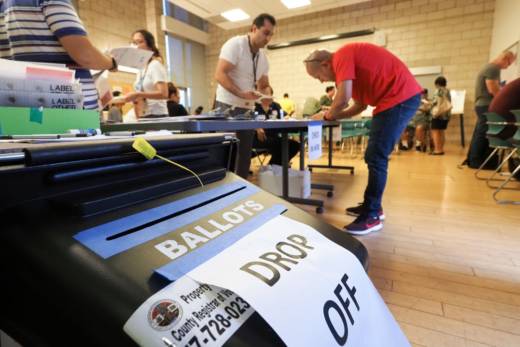“It’s important to recognize that throughout our nation’s history, voters have gone to the polls in times of peace, in times of war, in good economic times, during economic recessions, including the Great Depression and even during the 1918 Spanish flu pandemic,” Padilla told KQED on Thursday. “We’ve had our share of challenges over the years, but our democracy has proven to be resilient. And I think it’s with that spirit that we look at how to best prepare for this November’s election.”
Padilla said many policies embraced in recent years by the state, including online voter registration and increasing the ease of using vote-by-mail ballots, “will serve us well in terms of keeping our democracy going during this public health crisis.”
Kim Alexander, president of the California Voter Foundation — a nonpartisan group dedicated to ensuring access to voting — said it’s true that California is in a good spot compared to many other states, given its commitment to voting access. But she noted that Los Angeles County saw big problems during the March primary, when it moved to a new voting system and eliminated hundreds of polling places in favor of voting centers, resulting in hours-long lines on Election Day.
“So there already was a discussion going on — and there is a discussion going on — among lawmakers, the secretary of state and the LA County Board of Supervisors about the feasibility of expanding vote-by-mail ballot distribution in Los Angeles County to all 5.5 million registered voters there,” she said.
And even if counties can get all voters a ballot in the mail, another challenge remains, noted Alexander: making sure voters know they have them.
“When voters don’t connect with their ballots, they end up showing up at polling places on Election Day asking to vote, and then they’re stuck voting with a provisional ballot. … That creates a lot of unhappy voters because they don’t want to cast provisional ballots and it makes more work for election officials,” she said.
Padilla said counties will get some practice in the coming weeks, and the state will learn some lessons, when three separate jurisdictions — Riverside County, portions of Los Angeles and Ventura counties and the city of Westminster in Orange County — hold separate special elections in April and May.
Last week, Gov. Gavin Newsom signed an executive order making all three of those elections vote-by-mail ballot only.
And broadly speaking, Padilla added, voting by mail “has been gaining in popularity,” in California.
“You know, in some counties maybe 50% or slightly higher vote by mail. Other counties have been north of 70% for some time,” he said. “So moving to a model that calls for every voter being mailed a ballot automatically shouldn’t be as big of a shift for counties in California as for jurisdictions in other parts of the country.”
Orange County Registrar of Voters Neal Kelley will oversee the April 7 election in Westminster, a vote to recall the mayor and two city council members. Since about 80 percent of voters in the county are already used to voting by mail, he doesn’t think the switch to an entirely vote-by-mail election will be all that difficult.

